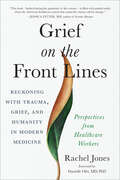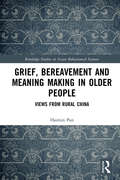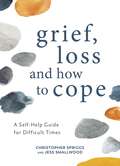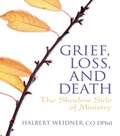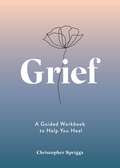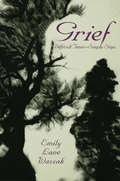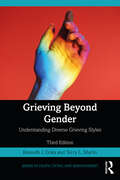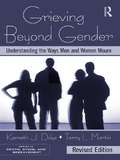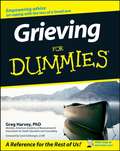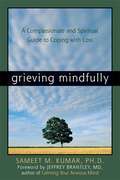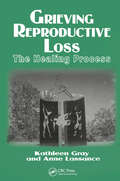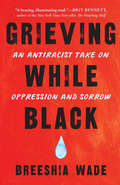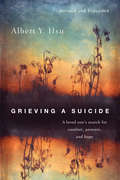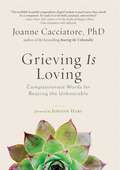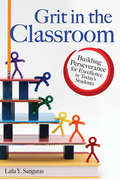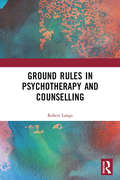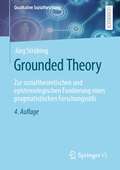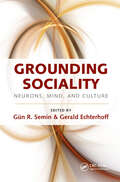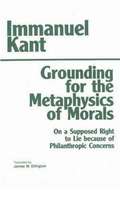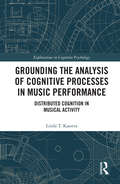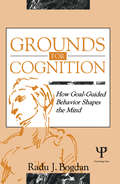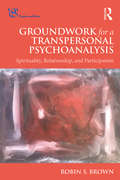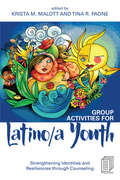- Table View
- List View
Grief on the Front Lines: Reckoning with Trauma, Grief, and Humanity in Modern Medicine
by Rachel JonesFor readers of Atul Gawande and Siddhartha Mukherjee--a timely, vital exploration of the burnout, grief, depression, and trauma that America&’s healthcare system engenders among doctors, nurses, and medical workers.Practicing medicine is traumatic: coping with the death of a patient, sharing a life-changing diagnosis, grieving futility in the face of a no-win situation. The emotional burden placed on doctors, nurses, and other healthcare practitioners is profound...and yet their suffering is often displaced, dismissed, or unrecognized.Here, Rachel Jones breaks the silence, daring to imagine a future where every healthcare worker is provided with the right tools to process grief, the space to integrate trauma, and--most importantly--the knowledge that they&’re not alone. Drawing from the latest research and more than 100 interviews with healthcare professionals across different specialties, backgrounds, and institutions, Jones identifies how US medicine fails its workers--and how it can do better.Speaking with urgency about the systemic shortcomings that contribute to widespread depression, burnout, suicide, and PTSD among physicians and nurses--a culture of stoicism, the pressure of 80-hour workweeks--Grief on the Front Lines shares the stories of everyday healthcare heroes and offers a glimpse into the educational programs, retreats, therapeutic offerings, and peer support networks already building a hopeful new culture of medicine that cares for its own.
Grief, Bereavement and Meaning Making in Older People: Views from Rural China (Routledge Studies in Asian Behavioural Sciences)
by Haimin PanSpousal bereavement seems to be one of the most devastating things a person can suffer through during the course of his or her life and it can result in adverse bio-psycho-social consequences for the left behind spouse. This book offers updated views from incorporating meaning making theory and social constructionist theory to examine the mediating roles of meaning making and help readers to understand grief and bereavement experiences of the widowed elderly population in China. The volume starts with elaborating on the meaning making model, followed by an overview of grief theories and traditional culture, including empirical feedback of the results of applying the model to Chinese elderly widows and widowers. Pan’s book concludes with a discussion on the implications and limitations of this research as well as future directions. The volume provides valuable theoretical reflection and empirical evidence on grief and bereavement experiences of the elderly population in China. By combining meaning making theory with a social constructionist perspective, this research develops a novel approach to apply Western models and theories to the Chinese context and effectively study China’s elderly population and their grief and bereavement experiences. This volume brings the readers the benefits of understanding Chinese cultural doctrines regarding death and life, getting a comprehensive view on meaning making theory, as well as learning the specific coping skills of Chinese elderly in widowhood. This volume merits the attention of those in the fields of mental health, social work, and gerontology to help further their understanding of meaning making systems in a non-western setting.
Grief, Loss and Bereavement: Evidence and Practice for Health and Social Care Practitioners
by Peter Wimpenny and John CostelloDealing with the social experience of grief, loss and bereavement are challenging areas for everyone, including health and social care practitioners who are often well placed to offer help and support to the bereaved. This book draws together a comprehensive range of worldwide evidence for understanding and supporting the bereaved in a variety of health and social care contexts. It can be used by practitioners from a wide range of backgrounds in both health and social care to gain an appreciation of bereavement and its associated support and care. Additionally, it can be used for personal and professional development by practitioners who want to enhance their own and others’ practice with the bereaved in specific contexts or organisations. The book may also be of value to those undertaking post graduate study who want to gain a wider understanding of the evidence related to bereavement and bereavement care practice in health and social care and may be seeking to add to the body of evidence in this field.
Grief, Loss and How to Cope: A Self-Help Guide for Difficult Times
by Christopher Spriggs Jess SmallwoodGrief takes many forms. With simple advice and comforting words, this book is a calm and approachable guide to coping with feelings of grief and lossGrief is something we will all face at some point in our lives. It can affect us at many stages – after the loss of a loved one, a job or sense of identity, during a divorce, or after a child has left home. However, despite being a universal experience, these emotions often leave us feeling alone, confused and overwhelmed.With clear information to help you explore and process your feelings, this book is here to support you as you find your own path through grief. You will find advice on:What grief is and how you might experience itHow we grieve, including common stages of grievingHow to cope with immediate feelings of griefHow to live with grief and loss in the longer termHow to support others who are grievingGrief will look and feel different for everyone but, whatever your experience, you are not alone, and the support and guidance in these pages will help you navigate your feelings and find strength again.
Grief, Loss, and Death: The Shadow Side of Ministry
by Andrew J Weaver Halbert WeidnerLearn to balance the professional demands of your ministry with your personal needsNo amount of research, study, or planning can prepare pastoral care givers for the stress placed on their personal lives by the demands of their ministries. But Grief, Loss, and Death: The Shadow Side of Ministry can help anyone involved in pastoral counseling close the gap between their professional and personal needs, encouraging them to use the stress, loss, and grief that accompanies pastoral care giving as opportunities to humanize their ministries and reaffirm their faith. This unique book offers comfort and solace to those in the chaplaincy who are torn between professional obligations and the limits and boundaries of the shadow side of their ministry-the human side. The shadow side of ministry shoots a bullet through the brain that does not kill or prevent thinking or feeling. But the bullet creates a hole, a long, hollow, empty wound that thinking and feeling must somehow bypass. The wounded minister does not recover the previous self, cannot remember what the old self thought or felt. Like a veteran of a secret war, there may be a new life after the shameful wound, but no public way to heal. But there is a public way of speaking about it and this may help relieve some of the shame and some of the self-blaming.-Author Halbert WeidnerGrief, Loss, and Death: The Shadow Side of Ministry can help in your search for the answers to questions you may have already found yourself asking, including: Do I prefer co-workers or friends? How did I lose focus of my original goals? How did I become isolated? How can I share authority without giving up responsibility? How do I cope when family issues arise?The book also addresses issues of illness, death and suicide, funerals, the confrontation between joy and sorrow, and how life&’s stages are often like the Stations of the Cross. Grief, Loss, and Death: The Shadow Side of Ministry is help against despair. Newcomers to the profession can use the book as a guide to the difficulties that lie ahead, and experienced pastoral care givers can employ it as a catalogue to be consulted when all hope seems lost.
Grief: A Guided Workbook to Help You Heal
by Christopher SpriggsWith comforting advice and supportive activities, Grief: A Guided Workbook to Help You Heal is a comforting companion to help you make sense of your feelings after experiencing loss. If you're dealing with grief, you may feel isolated and alone, but this book is here to offer you support through each step of this personal journey.
Grief: A Guided Workbook to Help You Heal
by Christopher SpriggsWith comforting advice and supportive activities, Grief: A Guided Workbook to Help You Heal is a comforting companion to help you make sense of your feelings after experiencing loss. If you're dealing with grief, you may feel isolated and alone, but this book is here to offer you support through each step of this personal journey.
Grief: Difficult Times, Simple Steps
by Emily L. WaszakDeath has been around for as long as life, yet when it happens, no one really knows how to deal with death or its consequences. Death should not be treated as a taboo subject instead, individuals must learn the techniques necessary to assist others in coping with such a loss.; In a practical format, this guide shows what to do and what not to do for a person who has suffered the death of a loved one. Using the language of the lay person, the book contains over 100 tips for caregivers or loved ones - a simple step is presented on each page, followed by reasons and instructions for each step.; After these steps are mastered, it will be possible to educate others so that death becomes more familiar and maybe a little easier to deal with.
Grieving Beyond Gender: Understanding Diverse Grieving Styles (Series in Death, Dying, and Bereavement)
by Kenneth J. Doka Terry L. MartinThe third edition of Grieving Beyond Gender explores the different ways that individuals grieve, noting that gender is only one factor that affects an individual’s style or pattern of grief.Inherent in the concept of grieving styles is a notion that gender is fluid and that traditional binary views of gender are belied by the concept of grieving styles, and this is highlighted and explored in more depth in the new edition. Doka and Martin present a model firmly grounded in social science theory and research, and place special emphasis on the model’s clinical implications. Clinicians will come away from this book with concrete tools for supporting different types of grievers through individual counseling or group support.
Grieving Beyond Gender: Understanding the Ways Men and Women Mourn, Revised Edition (Series in Death, Dying, and Bereavement)
by Kenneth J. Doka Terry L. MartinGrieving Beyond Gender: Understanding the Ways Men and Women Mourn is a revision of Men Don’t Cry, Women Do: Transcending Gender Stereotypes of Grief. In this work, Doka and Martin elaborate on their conceptual model of "styles or patterns of grieving" – a model that has generated both research and acceptance since the publication of the first edition in 1999. In that book, as well as in this revision, Doka and Martin explore the different ways that individuals grieve, noting that gender is only one factor that affects an individual’s style or pattern of grief. The book differentiates intuitive grievers, where the pattern is more affective, from instrumental grievers, who grieve in a more cognitive and behavioral way, while noting other patterns that might be more blended or dissonant. The model is firmly grounded in social science theory and research. A particular strength of the work is the emphasis placed on the clinical implications of the model on the ways that different types of grievers might best be supported through individual counseling or group support.
Grieving For Dummies
by Greg HarveyCoping and recovery strategies for dealing with the loss of a loved one Whether the death of a loved one is sudden or expected, grieving the loss is a difficult yet transformative process. Grieving For Dummies approaches this very important subject with sensitivity, helping readers who are grieving the loss of a loved one as well as those who want to support them in this process. This compassionate guide covers all types of profound losses, including parents, spouses and partners, children, siblings, friends, and pets. It also addresses children's grieving and how the manner of death may cause additional hurdles to grieving the loss. The book is filled with practical suggestions for moving through the phases, stages, and tasks of grieving with an eye towards successfully integrating the loss of a loved one, while at the same time, keeping the love shared alive.
Grieving Mindfully: A Compassionate and Spiritual Guide to Coping with Loss
by Sameet M. KumarIn this compassionate and practical book, a Buddhist psychotherapist, Sameet Kumar, Ph. D. , who specializes in applying meditation techniques to clinical problems, uses a unique combination of Buddhist spiritual practice and proven psychological strategies to help readers develop, understand, and transform their grief.
Grieving Reproductive Loss: The Healing Process (Death, Value and Meaning Series)
by Kathleen Gray Anne LassanceGrieving Reproductive Loss: The Healing Process acknowledges the devastating impact these losses can have. Written in ""plain language"", the book attempts to bring about a greater understanding of the grief associated with reproductive loss and, through the Healing Process Model[copyright], offers a holistic approach for constructive healthy grieving and healing of body, mind, and spirit.
Grieving While Black: An Antiracist Take on Oppression and Sorrow
by Breeshia WadeAn exploration of grief and racial trauma through the eyes of a Black end-of-life caregiver.Most of us understand grief as sorrow experienced after a loss—the death of a loved one, the end of a relationship, or a change in life circumstance. Breeshia Wade approaches grief as something that is bigger than what's already happened to us—as something that is connected to what we fear, what we love, and what we aspire toward. Drawing on stories from her own life as a Black woman and from the people she has midwifed through the end of life, she connects sorrow not only to specific incidents but also to the ongoing trauma that is part and parcel of systemic oppression.Wade reimagines our relationship to power, accountability, and boundaries and points to the long-term work we must all do in order to address systemic trauma perpetuated within our interpersonal relationships. Each of us has a moral obligation to attend to our own grief so that we can responsibly engage with others. Wade elucidates grief in every aspect of our lives, providing a map back to ourselves and allowing the reader to heal their innate wholeness.
Grieving a Suicide: A Loved One's Search for Comfort, Answers, and Hope
by Albert Y. HsuA 2003 Finalist in the United Kingdom Christian Book Awards
Grieving is Loving: Compassionate Words For Bearing The Unbearable
by Joanne CacciatoreIn the style of a quote-a-day collection, this book from Wisdom&’s bestselling author Joanne Cacciatore distills down the award-winning book Bearing the Unbearable into easy-to-access small chunks, and includes much brand-new material, including new prose and poems from Dr. Jo and other sources as well.From INDIES Gold Medal Award-Winner and Wisdom Bestseller Joanne Cacciatore If you love, you will grieve—and nothing is more mysteriously central to becoming fully human. This book is a companion to carry with you throughout your day, to touch in with and be supported by when bearing the unbearable pain of a loved one&’s death—whether weeks or years since their passing. Our culture often makes the bereaved feel alone, isolated, broken, and like they should just &“get over it&”—this book offers a loving antidote. Open to any page and you&’ll find something that will instantly help you feel not alone, while honoring the full weight of loss. This book is comprised of quotations from Bearing the Unbearable, and other sources as well, plus an enormous amount of new material from Dr. Jo. Especially well-suited for the grieving mind that may struggle with concentration, just 30 seconds on any page will empower, hearten, and validate any bereaved person—helping give strength and courage to bear life&’s most painful losses. Praise for Bearing the Unbearable &“This masterpiece is the greatest gift I could give to someone entrenched in grief, or to the loved ones of the bereaved.&”—The Tattooed Buddha &“Simply the best book I have ever read on the process of grief.&”—Huffington Post &“Anyone who's trying to deal with a loss, or anyone who knows someone dealing with a loss, (and in truth, isn't that everyone?) will benefit from reading this amazing book.&”—Foreword Reviews &“It offers hope for those who feel like their loss has disconnected themselves forever from humanity and the circle of life.&”—Doug Bremner, MD, professor of psychiatry, Emory University and author of You Can&’t Just Snap Out of It &“This is a holy book, riddled with insight and compassion.&”—Francis Weller, author of The Wild Edge of Sorrow
Grit in the Classroom: Building Perseverance for Excellence in Today's Students
by Laila SangurasThe combination of sustained hard work and resiliency, grit is the difference between those who give up and those who don't. Grit in the Classroom: Building Perseverance for Excellence in Today's Students assists educators in creating a learning environment that fosters grit development for all students, regardless of ability. Each chapter includes stories to illustrate the research and ideas presented and ends with discussion questions that can be used to continue the conversation. In an era of talent development and the pursuit of excellence, learners must be equipped with the perseverance that is essential to reaching high levels of success. This book provides a rationale for teaching grit in the classroom with the goal of propelling this topic into discussions of building passion and talent in today's students.
Ground Rules in Psychotherapy and Counselling
by Robert LangsRobert Langs has long been one of the most individual and controversial psychoanalytic theorists. In this book, he concentrates on one of the most prominent areas of his thought: his insistence upon adherence to strict rules for boundaries (or "frames") in psychotherapy and psychoanalysis.Starting from the statement that "Throughout the history of the universe, frames, contexts, rules, and boundaries have been vital aspects of the development and very existence of both physical structures and living organisms," Langs goes on to examine the profile of the issues of boundaries in psychoanalytic thought. He discusses Freud's technique papers on the subject, and goes on to elucidate his own approach, rooted in his thinking on evolutionary and adaptive processes which he has discussed in his previous work. Throughout the book, Langs gives both theoretical discussions and practical groundings of his ideas. As with his previous book, Doing Supervision and Being Supervised (1994), Robert Langs here brings his unique energy and viewpoint to bear on an important but little-examined topic.
Grounded Theory: Zur sozialtheoretischen und epistemologischen Fundierung eines pragmatistischen Forschungsstils (Qualitative Sozialforschung)
by Jörg StrübingWenig wurde bislang über die erkenntnistheoretische Fundierung der Grounded Theory in der pragmatischen Sozialphilosophie und die daraus resultierenden Konsequenzen für das Verständnis der methodologischen Konzeption wie der praktischen Verfahren geschrieben. Der Band schließt diese Lücke, indem das Erkenntnismodell, ausgehend von den Arbeiten von C.S. Peirce, J. Dewey, G.H. Mead und W. James, vorgestellt und den Spuren nachgegangen wird, die dieses Modell als Geltungsbegründung in der Methodologie der Grounded Theory hinterlassen hat. Dabei geht der Text auch auf die gravierenden methodologischen Unterschiede zwischen der von Anselm L. Strauss geprägten und der von Barney G. Glaser vertretenen Variante von Grounded Theory ein und beschäftigt sich mit wesentlichen Weiterentwicklungen einer pragmatistischen Grounded Theory im Kontext postmodernen Denkens. Die vorliegende, vierte Auflage schließt zudem den aktuellen Diskurs um die Etablierung ansatzübergreifender Gütekriterien qualitativen Forschens an die Grounded Theory-immanenten Strategien zur Qualitätssicherung an. Forschende erhalten damit eine wertvolle Argumentationshilfe für die Legitimation ihrer empirischen Designs.
Grounding Sociality: Neurons, Mind, and Culture
by Gün R. SeminThis volume concerns the longstanding intellectual puzzle of how individuals overcome their biological, neural, and mental finitude to achieve sociality. It explores how humans take each other into account, coordinate their actions, and are able to share their inner states and to communicate. Sophisticated views on the bases of sociality are detailed at the level of neural mechanisms, perception and memory, motivation, communication and dialog, culture, and evolution. These insights have been inspired by major strides and exciting new developments in disciplines as far afield as ethology, evolutionary ecology, neuroscience, cognition, memory, developmental and social psychology, psycholinguistics, philosophy, robotics, and sociology. The volume is the first to bridge these disciplinary boundaries to lay the foundations for an integrated and general conceptualization of the bases of sociality and its implications for psychology. Each contribution presents different levels of the grounding of sociality and will further stimulate novel approaches to linking different layers of sociality, from the neural to the cultural level.
Grounding for the Metaphysics of Morals: with, On a Supposed Right to Lie Because of Philanthropic Concerns
by Immanuel Kant James W. EllingtonTranslation of: Grundlegung zur Metaphysik der Sitten: and of: Uber ein vermeintes Recht aus Menschenliebe zu lugen. This is the third edition of this volume.
Grounding the Analysis of Cognitive Processes in Music Performance: Distributed Cognition in Musical Activity (Explorations in Cognitive Psychology)
by Linda T. KaastraThrough the systematic analysis of data from music rehearsals, lessons, and performances, this book develops a new conceptual framework for studying cognitive processes in musical activity. Grounding the Analysis of Cognitive Processes in Music Performance draws uniquely on dominant paradigms from the fields of cognitive science, ethnography, anthropology, psychology, and psycholinguistics to develop an ecologically valid framework for the analysis of cognitive processes during musical activity. By presenting a close analysis of activities including instrumental performance on the bassoon, lessons on the guitar, and a group rehearsal, chapters provide new insights into the person/instrument system, the musician’s use of informational resources, and the organization of perceptual experience during musical performance. Engaging in musical activity is shown to be a highly dynamic and collaborative process invoking tacit knowledge and coordination as musicians identify targets of focal awareness for themselves, their colleagues, and their students. Written by a cognitive scientist and classically trained bassoonist, this specialist text builds on two decades of music performance research; and will be of interest to researchers, academics, and postgraduate students in the fields of cognitive psychology and music psychology, as well as musicology, ethnomusicology, music theory, and performance science. Linda T. Kaastra has taught courses in cognitive science, music, and discourse studies at the University of British Columbia (UBC) and Simon Fraser University. She earned a PhD from UBC’s Individual Interdisciplinary Graduate Studies Program.
Grounds for Cognition: How Goal-guided Behavior Shapes the Mind
by Radu J. BogdanQ: Why do organisms need cognition? A: To get information about their environments. Q: Why such information? A: Because organisms need to guide their behaviors to goals. Q: Why guidance? A: Because it leads to goal satisfaction. Q: Why goals? Cognition is a naturally selected response by genetic programs to the evolutionary pressure of guiding behaviors to goals. Organisms are material systems that maintain and replicate themselves by engaging their world in goal-directed ways. This is how guidance of behavior to goal grounds and explains cognition and the main forms in which it manages information. Guidance to goal also makes a difference to the understanding of human cognition. Simpler forms of cognition evolve to handle fixed informational transactions with the world, whereas human cognition evolves the abilities to script flexible goal situations that fit specific contexts of behavior. This teleoevolutionary approach has important implications for cognitive science, two of which are programmatic. One is that information that guides to goal is not exclusively cognitive; guidance is also affected by ecological facts and regularities as well as by design assumptions about them. The other implication is that the functional analyses dominant in cognitive science and philosophy of mind are incomplete and weak. They are incomplete in that they focus only on the explicitly encoded cognitive information and its behavioral consequences, thus ignoring the larger guidance arrangements; and weak because causal and functional relations implement but underdetermine goal-directed and goal-guided procesess. A work dealing expressly with the foundations of cognitive science, this book addresses basic but seldom-asked questions about the evolutionary rationale of cognition and the way this rationale has shaped the major types of cognition. It also provides a teleological answer to these basic questions in terms of goal directedness and particularly guidance of behavior to goal. In so doing, the work defends the scientific respectability and the explanatory necessity of teleology by showing that goal directedness characterizes the work of genetic programs.
Groundwork for a Transpersonal Psychoanalysis: Spirituality, Relationship, and Participation (Psyche and Soul)
by Robin S. BrownThis book explores how a deeper engagement with the theme of spirituality can challenge and stimulate contemporary psychoanalytic discourse. Bringing relational psychoanalysis into conversation with Jungian and transpersonal debates, the text demonstrates the importance of questioning an implicit reliance on secular norms in the field. With reference to recognition theory and shifting conceptions of enactment, Brown shows that the continued evolution of relational thinking necessitates an embrace of the transpersonal and a move away from the secular viewpoint in analytic theory and practice. With an outlook at the intersection of intrapsychic and intersubjective perspectives, Groundwork for a Transpersonal Psychoanalysis will be a valuable resource to analysts looking to incorporate a more pluralistic approach to clinical work.
Group Activities for Latino/a Youth: Strengthening Identities and Resiliencies through Counseling
by Krista M. Malott Tina R. PaoneDirectly applicable to practice, Group Activities for Latino/a Youth allows helping professionals such as human service workers, social workers, and school and community mental health counselors to select and apply a series of group sessions with topics relevant to today’s Latino/a youth. Each session contains detailed directions, suggested discussion questions, and additional readings on specific topics, with topic examples including grief, identity development, and conflict resolution. Sessions draw on Latino/a cultural norms and strengths to build culturally-informed communication and coping skills in an effort to improve educational, social, and career outcomes. A developmental perspective is used, and sessions are designed to be creative and interactive in order to appeal to the high energy and playfulness of youth at any age. Group Activities for Latino/a Youth helps professionals to better engage and retain Latino/a clients, a group that traditionally experiences one of the largest drop-out rates in therapy, often due to interventions largely informed by dominant Anglo norms and traditions.
